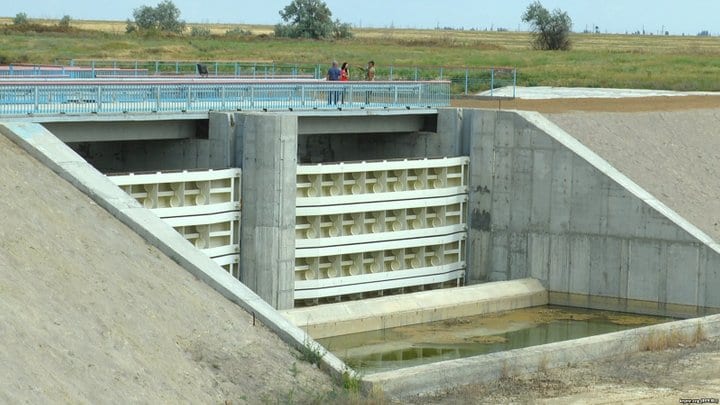Natalya Poklonskaya, a deputy of the lower chamber of the Russian parliament, sent a letter to the UN High Commissioner for Human Rights calling to condemn the actions of the Ukrainian authorities that cut off the fresh water supply to Crimea. According to Poklonskaya, such actions are a blatant violation of the basic rights of Crimea residents, threaten their lives and destroy the ecosystem of the region.
The situation of fresh water supply in Crimea is really difficult. However, it is worth remembering the root of the problem. In spring 2014, Russia annexed the Crimean Peninsula of Ukraine using their army. Mrs. Poklonskaya was then an ordinary employee of the Prosecutor’s office of Crimea, and having betrayed her oath, she defected to the Russian side. After the Crimea annexation, Ukraine almost immediately began construction of a dike to block the North Crimean Canal, through which the Dnieper water flew to the north of the peninsula.
To assess the extent of the problem that has arisen as a result of the canal shutoff, we must understand that the peninsula was 82-85% dependent on the Dnieper water coming from mainland Ukraine, the bulk of which was allocated to the agriculture needs, and 20% – to household and drinking water supply.
By all means, other rivers in Crimea fill Crimean reservoirs with their waters as well, however, their state directly depends on the rainfall amount. Unusually warm and dry winter this year had an extremely negative impact on filling of the reservoirs.
Also, we should keep in mind the increase of the population of the peninsula to two millions after the annexation. According to expert estimates, accessible Crimean water resources may supply water to a little more than one million people. That is, the needs of the civilians could still be more or less covered by the resources of the peninsula. But taking into account agriculture, industrial facilities and the fact that the peninsula has actually became a naval base, the peninsula falls short of water for population.
Local authorities put attempts to solve the problem by active ground water exploration and drilling wells throughout the peninsula. Still these resources are clearly insufficient, and their rapid development leads to soils salinization, especially in coastal areas. The cities and towns of Crimea are mainly located along the sea line. The use of local water basins leads to their dehumidification and, as a result, to soil dehydratation and loosening, the impossibility of their further use.
Actually, the problem with water supply arose after the annexation of the peninsula by Russia. However, the local authorities and the top leadership of Russia, who seized foreign territories, have proved all this time that the problem is insignificant, and is easy to solve. For example, even the possibility of building a water pipe running from the mainland of Russia was considered, but it appeared that this problem is the same serious in the Russian regions close to Crimea. Well, Mrs. Poklonskaya’s letter once again testifies to the aggravation of a situation in the region.
In her address to the UN, N. Poklonskaya appeals to the fact that the North Crimean Canal was built during the Soviet era and was filled with water from the Dnieper, originating in Russia. But, firstly, the canal was built during 1960s – 70s, when Crimea was a part of Ukraine already. Secondly, after the annexation, Ukraine blocked up not the natural but the man-made river channel (which was filled from the Kakhovka water basin specially constructed along the lower reaches of the Dnieper). The provisions of the UN Water Convention do not apply to such objects. In addition, it was essential to recall that for the whole world, Crimea is still the territory of Ukraine. That is why the calls of the Russian politicians and public figures to block the Dnieper for Ukraine as a response to its actions and let the water pass directly to the Crimea by alternate channels seem rather utopian and are aimed at supporting anti-Ukrainian rhetoric in the Russian information space.
As it comes from the 4th Geneva Convention of 1949, maintenance of the occupied territory and meeting of the vital needs of its population is the responsibility of the occupying party. From the international law perspective, Crimea is the territory of Ukraine occupied by Russia. In addition, there is a specific case of improper use of water resources – for military bases created on the peninsula by Russia, which pose a security danger not only to Ukraine, but also to the entire Black Sea region. Obviously, in the context of the ongoing military conflict it would be extremely unreasonable step of the Ukrainian authorities to renew water supply to the territory where a large number of Russian troops and heavy weapons associated with Russia are located.

